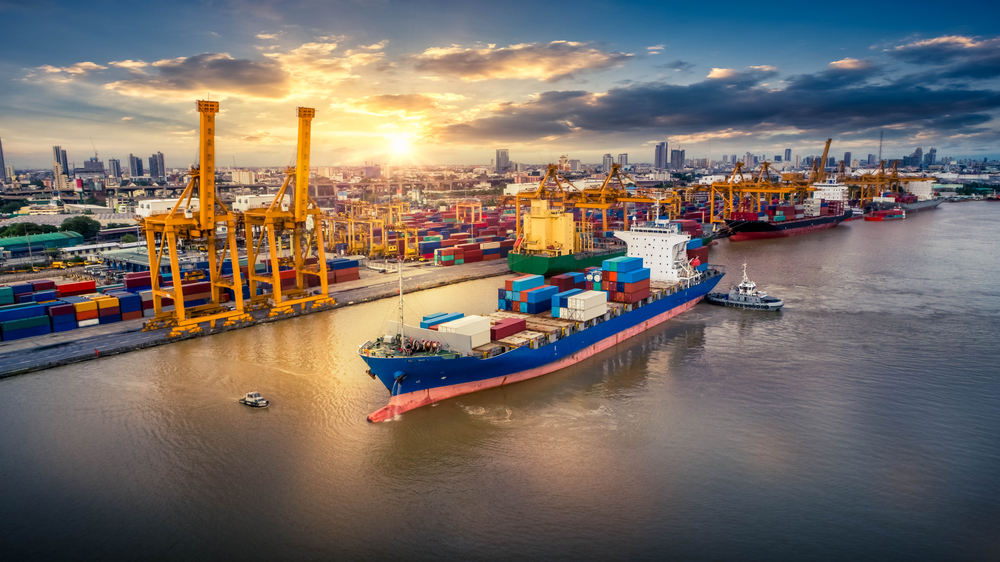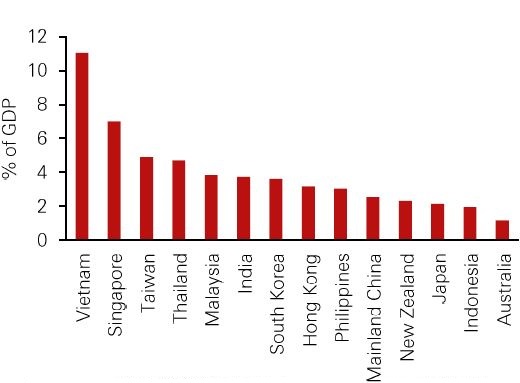
7 April 2025
Cheuk Wan Fan
Chief Investment Officer, Asia, HSBC Global Private Banking and Wealth
Patrick Ho, CFA
Chief Investment Officer, North Asia, HSBC Global Private Banking and Wealth
Kevin Leung
Investment Strategist, HSBC Global Private Banking and Wealth
Risk assets sold off sharply around the world after US President Donald Trump announced far-reaching and steeper-than-expected reciprocal tariffs that triggered market fears of an escalation of global trade war and recession risks.
On 4 April, China announced 34% retaliatory tariffs on all imports from the US, matching a 34% reciprocal tariff on Chinese imports announced by the White House. China’s retaliatory tariffs will be effective on 10 April, one day after the US reciprocal tariffs will be implemented. The newly announced 10% baseline tariffs already came into effect on 5 April.
China further announced a series of “countermeasures”, including export restrictions of seven types of rare earth minerals to the US, export controls on 16 American enterprises, an addition of 11 American enterprises to the unreliable entry list, and launching of an anti-dumping probe into medical CT tubes from the US.
Asia stands out in the epicenter of the US tariff tantrum with the highest reciprocal tariff rates hitting key US trading partners in the region – 46% on Vietnam, 36% on Thailand, 34% on mainland China, 32% on Taiwan, 25% on South Korea, and 24% on Japan.
According to the Cato Institute report, China’s 2023 trade-weighted average tariff rate was only 3% based on WTO trade data, which is much lower than the 67% “foreign tariff rate” calculated by the Trump administration. The formula disclosed by the Office of the US Trade Representative (USTR) was based on countries’ trade surpluses with the US, divided by the value of their total exports to the US, and ten dividend in half. This implies that individual reciprocal tariff rates are determined by the size of countries’ trade surplus with the US rather than absolute levels of their import tariff rates.
The ASEAN countries face the highest reciprocal tariff rates due to their large trade surpluses with the US. On 5 April, Vietnam proposed to cut tariffs on US imports to zero from the current 9.4% while Singapore stated it would not retaliate against the 10% minimum US tariff rate imposed on the country. Indonesia has pledged to ease trade rules and Cambodia also promised to cut its own tariffs on US goods and import more American products.
We believe reciprocal tariffs will bring substantial earnings impact on North Asia – Japan, South Korea and Taiwan, which have sizeable export sales and trade surpluses with the US. Although mainland China faces a hefty total effective US tariff rate of 74%, the actual revenue and earnings impact on the Chinese equity market may be less significant than expected due to MSCI China’s limited export goods sales exposure to the US at only 2%. Since the US-China trade war in 2028, Beijing has substantially reduced its trade dependence on the US market.

Source: CEIC, HSBC Global Private Banking and Wealth as of 7 April 2025.
The additional tariffs on automobiles and auto parts are expected to hit the sales of Japanese and South Korean automakers. Automotive exports to the US account for nearly 7% of Japan’s total exports of all products to the world. Senior Japanese government officials said they would continue to request for exception from the reciprocal tariffs and are ready to offer funding or other support for the local economy.
We think Taiwan is better positioned than Japan and South Korea to withstand the tariff shocks because semiconductor products are exempt from reciprocal tariffs. With stronger pricing power, some of the most advanced and competitive chip exporters may be able to pass on the additional costs to their customers.
As the markets are quickly repricing for increased US recession risks in the wake of the tariff tantrum, we expect further rotation out of the US equity market into Asia and Europe. We attach an even stronger emphasis on domestic resilience in positioning in the Asian equity and credit markets.
We remain overweight on Asia ex-Japan equities and favour markets with strong domestic growth drivers and policy stimulus, including China, India and Singapore. Both India and Singapore stand out as relative safe havens amid global tariff escalation. The exemption of pharmaceuticals, a key Indian export to the US, should help mitigate the tariff impact on the Indian economy.
We expect severe tariff headwinds will prompt the Chinese government to further ramp up fiscal and monetary stimulus to strive for the government’s 2025 GDP growth target of “around 5%”. The DeepSeek-driven AI innovation and investment boom should offer an important domestic growth engine. The newly announced 30 special initiatives are on the right track to boost the demand side of private consumption.
We recently upgraded the domestically-driven sectors of consumer discretionary and financials in Asia to overweight to mitigate tariff risks. China’s AI-led investment boom and more forceful consumption-focused stimulus should bode well for the outlook of the Asian consumer discretionary and communications services sectors. We cut Asian IT to neutral given that technology hardware companies are significantly exposed to US tariff and growth risks.
The chances of significant policy easing in Asia have gone up amid global trade uncertainty and continued disinflation in the region. A more accommodative Asian central bank policy stance reinforces our preference for high quality Asian credit. We stay focused on Asian USD investment grade bonds, favouring Asian financials, Indian local currency debt, Chinese hard currency bonds in technology, financials and SOEs.
Outside of Asia, as we worry that the tariffs on China and retaliation will start to weigh on analyst sentiment towards the technology sector, while inflation concerns will also lead to weaker demand for consumption, we have downgraded Technology to neutral and Consumer Discretionary to underweight globally, and in the US and Europe.





This document or video is prepared by The Hongkong and Shanghai Banking Corporation Limited (‘HBAP’), 1 Queen’s Road Central, Hong Kong. HBAP is incorporated in Hong Kong and is part of the HSBC Group. This document or video is distributed and/or made available, HSBC Bank (China) Company Limited, HSBC Bank (Singapore) Limited, HSBC Bank Middle East Limited (UAE), HSBC UK Bank Plc, HSBC Bank Malaysia Berhad (198401015221 (127776-V))/HSBC Amanah Malaysia Berhad (20080100642 1 (807705-X)), HSBC Bank (Taiwan) Limited, HSBC Bank plc, Jersey Branch, HSBC Bank plc, Guernsey Branch, HSBC Bank plc in the Isle of Man, HSBC Continental Europe, Greece, The Hongkong and Shanghai Banking Corporation Limited, India (HSBC India), HSBC Bank (Vietnam) Limited, PT Bank HSBC Indonesia (HBID), HSBC Bank (Uruguay) S.A. (HSBC Uruguay is authorised and oversought by Banco Central del Uruguay), HBAP Sri Lanka Branch, The Hongkong and Shanghai Banking Corporation Limited – Philippine Branch, HSBC Investment and Insurance Brokerage, Philippines Inc, and HSBC FinTech Services (Shanghai) Company Limited and HSBC Mexico, S.A. Multiple Banking Institution HSBC Financial Group (collectively, the “Distributors”) to their respective clients. This document or video is for general circulation and information purposes only.
The contents of this document or video may not be reproduced or further distributed to any person or entity, whether in whole or in part, for any purpose. This document or video must not be distributed in any jurisdiction where its distribution is unlawful. All non-authorised reproduction or use of this document or video will be the responsibility of the user and may lead to legal proceedings. The material contained in this document or video is for general information purposes only and does not constitute investment research or advice or a recommendation to buy or sell investments. Some of the statements contained in this document or video may be considered forward looking statements which provide current expectations or forecasts of future events. Such forward looking statements are not guarantees of future performance or events and involve risks and uncertainties. Actual results may differ materially from those described in such forward-looking statements as a result of various factors. HBAP and the Distributors do not undertake any obligation to update the forward-looking statements contained herein, or to update the reasons why actual results could differ from those projected in the forward-looking statements. This document or video has no contractual value and is not by any means intended as a solicitation, nor a recommendation for the purchase or sale of any financial instrument in any jurisdiction in which such an offer is not lawful. The views and opinions expressed are based on the HSBC Global Investment Committee at the time of preparation and are subject to change at any time. These views may not necessarily indicate HSBC Asset Management‘s current portfolios’ composition. Individual portfolios managed by HSBC Asset Management primarily reflect individual clients’ objectives, risk preferences, time horizon, and market liquidity.
The value of investments and the income from them can go down as well as up and investors may not get back the amount originally invested. Past performance contained in this document or video is not a reliable indicator of future performance whilst any forecasts, projections and simulations contained herein should not be relied upon as an indication of future results. Where overseas investments are held the rate of currency exchange may cause the value of such investments to go down as well as up. Investments in emerging markets are by their nature higher risk and potentially more volatile than those inherent in some established markets. Economies in emerging markets generally are heavily dependent upon international trade and, accordingly, have been and may continue to be affected adversely by trade barriers, exchange controls, managed adjustments in relative currency values and other protectionist measures imposed or negotiated by the countries with which they trade. These economies also have been and may continue to be affected adversely by economic conditions in the countries in which they trade. Investments are subject to market risks, read all investment related documents carefully.
This document or video provides a high-level overview of the recent economic environment and has been prepared for information purposes only. The views presented are those of HBAP and are based on HBAP’s global views and may not necessarily align with the Distributors’ local views. It has not been prepared in accordance with legal requirements designed to promote the independence of investment research and is not subject to any prohibition on dealing ahead of its dissemination. It is not intended to provide and should not be relied on for accounting, legal or tax advice. Before you make any investment decision, you may wish to consult an independent financial adviser. In the event that you choose not to seek advice from a financial adviser, you should carefully consider whether the investment product is suitable for you. You are advised to obtain appropriate professional advice where necessary.
The accuracy and/or completeness of any third-party information obtained from sources which we believe to be reliable might have not been independently verified, hence Customer must seek from several sources prior to making investment decision.
The following statement is only applicable to HSBC Mexico, S.A. Multiple Banking Institution HSBC Financial Group with regard to how the publication is distributed to its customers: This publication is distributed by Wealth Insights of HSBC México, and its objective is for informational purposes only and should not be interpreted as an offer or invitation to buy or sell any security related to financial instruments, investments or other financial product. This communication is not intended to contain an exhaustive description of the considerations that may be important in making a decision to make any change and/or modification to any product, and what is contained or reflected in this report does not constitute, and is not intended to constitute, nor should it be construed as advice, investment advice or a recommendation, offer or solicitation to buy or sell any service, product, security, merchandise, currency or any other asset.
Receiving parties should not consider this document as a substitute for their own judgment. The past performance of the securities or financial instruments mentioned herein is not necessarily indicative of future results. All information, as well as prices indicated, are subject to change without prior notice; Wealth Insights of HSBC Mexico is not obliged to update or keep it current or to give any notification in the event that the information presented here undergoes any update or change. The securities and investment products described herein may not be suitable for sale in all jurisdictions or may not be suitable for some categories of investors.
The information contained in this communication is derived from a variety of sources deemed reliable; however, its accuracy or completeness cannot be guaranteed. HSBC México will not be responsible for any loss or damage of any kind that may arise from transmission errors, inaccuracies, omissions, changes in market factors or conditions, or any other circumstance beyond the control of HSBC. Different HSBC legal entities may carry out distribution of Wealth Insights internationally in accordance with local regulatory requirements.
Important Information about the Hongkong and Shanghai Banking Corporation Limited, India (“HSBC India”)
HSBC India is a branch of The Hongkong and Shanghai Banking Corporation Limited. HSBC India is a distributor of mutual funds and referrer of investment products from third party entities registered and regulated in India. HSBC India does not distribute investment products to those persons who are either the citizens or residents of United States of America (USA), Canada or New Zealand or any other jurisdiction where such distribution would be contrary to law or regulation.
The following statement is only applicable to HSBC Bank (Taiwan) Limited with regard to how the publication is distributed to its customers: HSBC Bank (Taiwan) Limited (“the Bank”) shall fulfill the fiduciary duty act as a reasonable person once in exercising offering/conducting ordinary care in offering trust services/ business. However, the Bank disclaims any guarantee on the management or operation performance of the trust business.
The following statement is only applicable to PT Bank HSBC Indonesia (“HBID”): PT Bank HSBC Indonesia (“HBID”) is licensed and supervised by Indonesia Financial Services Authority (“OJK”). Customer must understand that historical performance does not guarantee future performance. Investment product that are offered in HBID is third party products, HBID is a selling agent for third party product such as Mutual Fund and Bonds. HBID and HSBC Group (HSBC Holdings Plc and its subsidiaries and associates company or any of its branches) does not guarantee the underlying investment, principal or return on customer investment. Investment in Mutual Funds and Bonds is not covered by the deposit insurance program of the Indonesian Deposit Insurance Corporation (LPS).
Important information on ESG and sustainable investing
Today we finance a number of industries that significantly contribute to greenhouse gas emissions. We have a strategy to help our customers to reduce their emissions and to reduce our own. For more information visit www.hsbc.com/sustainability.
In broad terms “ESG and sustainable investing” products include investment approaches or instruments which consider environmental, social, governance and/or other sustainability factors to varying degrees. Certain instruments we classify as sustainable may be in the process of changing to deliver sustainability outcomes. There is no guarantee that ESG and Sustainable investing products will produce returns similar to those which don’t consider these factors. ESG and Sustainable investing products may diverge from traditional market benchmarks. In addition, there is no standard definition of, or measurement criteria for, ESG and Sustainable investing or the impact of ESG and Sustainable investing products. ESG and Sustainable investing and related impact measurement criteria are (a) highly subjective and (b) may vary significantly across and within sectors.
HSBC may rely on measurement criteria devised and reported by third party providers or issuers. HSBC does not always conduct its own specific due diligence in relation to measurement criteria. There is no guarantee: (a) that the nature of the ESG / sustainability impact or measurement criteria of an investment will be aligned with any particular investor’s sustainability goals; or (b) that the stated level or target level of ESG / sustainability impact will be achieved. ESG and Sustainable investing is an evolving area and new regulations are being developed which will affect how investments can be categorised or labelled. An investment which is considered to fulfil sustainable criteria today may not meet those criteria at some point in the future.
THE CONTENTS OF THIS DOCUMENT OR VIDEO HAVE NOT BEEN REVIEWED BY ANY REGULATORY AUTHORITY IN HONG KONG OR ANY OTHER JURISDICTION. YOU ARE ADVISED TO EXERCISE CAUTION IN RELATION TO THE INVESTMENT AND THIS DOCUMENT OR VIDEO. IF YOU ARE IN DOUBT ABOUT ANY OF THE CONTENTS OF THIS DOCUMENT OR VIDEO, YOU SHOULD OBTAIN INDEPENDENT PROFESSIONAL ADVICE.
© Copyright 2025. The Hongkong and Shanghai Banking Corporation Limited, ALL RIGHTS RESERVED.
No part of this document or video may be reproduced, stored in a retrieval system, or transmitted, on any form or by any means, electronic, mechanical, photocopying, recording or otherwise, without the prior written permission of The Hongkong and Shanghai Banking Corporation Limited.